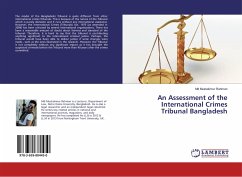The opaque delinquency of multinational companies is the visible mark of the shortcomings of international criminal law in the face of criminal phenomena with a trans-border and collective dimension. However, in the realization of their corporate purpose, these companies get bogged down in the swamp of human rights violations that may constitute crimes against humanity. These difficulties stem from the incompetence of the ICC with regard to legal persons, the non-recognition in international law of the legal personality of multinational corporations, and even if their involvement in acts that may constitute crimes against humanity is no longer an open secret, the reaction of international criminal law remains timid. The recourse to the creation of subsidiaries or suppliers in areas where the protection of fundamental rights is not respected is still a matter of concern in legislation that timidly organizes the prosecution of legal persons. It is on the rubble of this gloomy observation that this work was built, which intended to question international law on the content of the obligation to repress crimes against humanity.
Bitte wählen Sie Ihr Anliegen aus.
Rechnungen
Retourenschein anfordern
Bestellstatus
Storno








